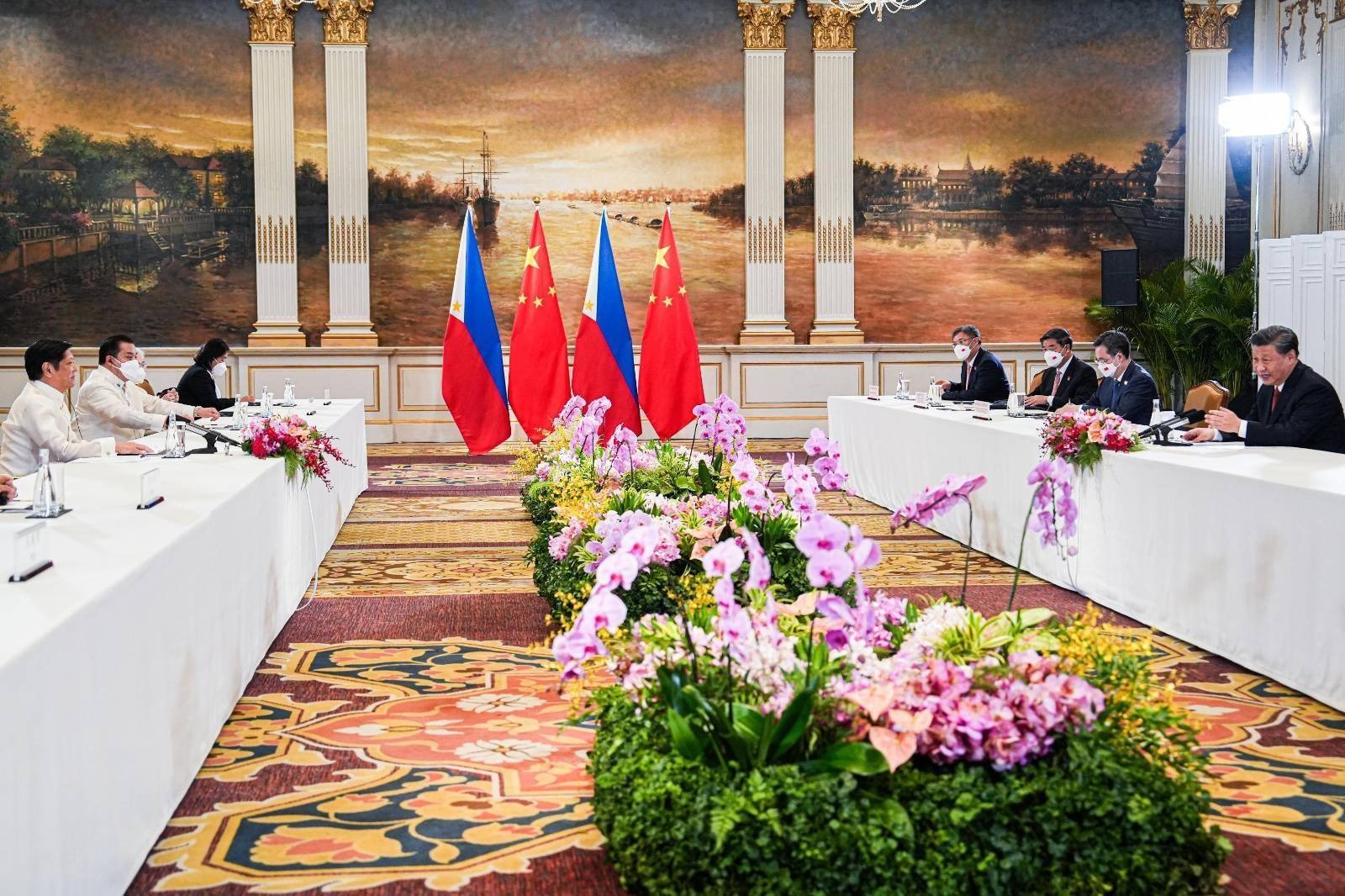News
Marcos, Xi seek early conclusion of negotiations for COC in SCS

President Ferdinand R. Marcos Jr. expressed elation Thursday after concluding a bilateral meeting with President Xi Jinping in Thailand, his first meeting with the Chinese leader. (OPS photo)
MANILA – President Ferdinand R. Marcos Jr. and Chinese President Xi Jinping have called for the immediate conclusion of negotiations for the final and binding Code of Conduct (COC) in the South China Sea (SCS) to address the maritime disputes among littoral states.
During a bilateral meeting in Bangkok, Thailand on Thursday, Marcos and Xi agreed that the issuance of the COC in the SCS is vital in resolving disputes among sea claimants, including the Philippines and China, the Department of Foreign Affairs (DFA) said in a news release on Friday.
Marcos and Xi concurred that the SCS issue should not affect the improving relations between the Philippines and China.
“On the South China Sea issue, the two leaders agreed that maritime issues do not define the totality of Philippines-China relations,” the DFA said. “They also reaffirmed their support for the early conclusion of a Code of Conduct on the South China Sea to help manage differences and regional tensions.”
Marcos earlier said he would raise the long-standing disputes in SCS when he gets the chance to meet with Xi.
As quoted by the DFA, Marcos told Xi that the Philippines is charting an independent foreign policy that “refuses to fall into the trap of a Cold War mindset.”
“Ours is an independent foreign policy guided by our national interest and commitment to peace,” he said during his first meeting with Xi.
China, the Philippines, and several other littoral states have overlapping claims in the SCS.
Beijing is claiming about 80 percent of the contested waters.
However, the Hague-based Permanent Court of Arbitration on July 12, 2016, ruled against China’s supposedly historic rights over nearly the entire SCS.
‘Enhanced’ economic, dev’t partnerships
Despite the SCS territorial disputes, Marcos and Xi renewed the Philippines and China’s ties and vowed to elevate their economic and development partnerships, the DFA said.
It said the two leaders vowed to improve the two nations’ cooperation in various fields, including agriculture, trade, infrastructure, energy, people-to-people ties, and pandemic response.
“Both leaders agreed to consider more infrastructure projects. President Xi cited the Davao-Samal bridge project in Davao as a prime example of infrastructure partnership. He thanked President Marcos for personally attending the groundbreaking ceremony for the bridge project,” the department said.
Xi also expressed openness to increasing the importation of quality agricultural produce from the Philippines, particularly the planned entry of durian to the Chinese market.
Oil issues
In Manila, the Chinese Embassy said “active consultations” on oil and gas exploration in the SCS are included in future plans.
Manila and Beijing signed a memorandum of understanding on joint oil and gas development in the West Philippine Sea in November 2018.
After three years of negotiations, the previous administration terminated the talks over “constitutional constraints” just before former president Rodrigo Duterte stepped down from office.
In August, DFA Secretary Enrique Manalo said Manila has already indicated its openness to have new talks on the subject.
The following month, the DFA said there had already been an “initial discussion” but official talks or working-level talks have yet to start.
Manila had repeatedly assured that any agreement that would result from the discussions would be in accordance with the constitution, which states that the exploration, development, and use of natural resources should be under the “full control and supervision” of the Philippine government.
“(China and the Philippines) should work together to reject unilateralism and acts of bullying, defend fairness and justice, and safeguard peace and stability in the region,” read the embassy statement.
Dindo Manhit, president of reasearch organization Stratbase ADR Institute, said the only way a negotiation on oil and gas exploration between the two states would move forward is by respecting the Philippine constitution.
“We should approach these talks with the Philippine national interest on top of mind,” he told the Philippine News Agency. “We should respect the constitution and the laws of the Philippine Republic. That’s the only way we can proceed with the oil and gas talks. And with the support of the Arbitral Award, that makes our case stronger.”
Grateful
Marcos likewise expressed gratitude to Xi for China’s donation of 20,000 tons of urea fertilizers and coronavirus disease 2019 (Covid-19) vaccines to the Philippines.
Marcos said China’s assistance to the Philippines has helped “strengthen trust” between the two nations and brought “tremendous growth” in exchanges and cooperation in agriculture, infrastructure, energy, and people-to-people ties.
The inaugural meeting between the two leaders happened after their phone call on May 18.
Marcos is also set to embark on a state visit to China in the first week of January 2023.





















